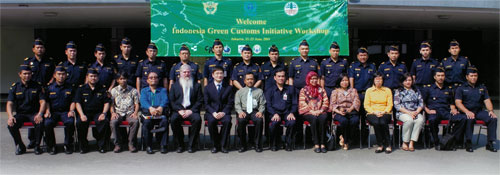 |
| Participants in the Indonesia Green Customs Initiative workshop |
The CITES Secretariat participated in the Indonesia Green Customs Initiative workshop organized by the UNEP Regional Office for Asia and the Pacific and the Indonesian government, held at the Customs training centre in Jakarta from 21 to 23 June 2011.
The workshop brought together 25 Customs officers from duty stations throughout the archipelago and resource persons from three Ministries, three UN agencies and two regional centres. This offered multilateral environmental agreements the opportunity to provide front-line officers with relevant practical training, which in the case of CITES centred on specimen identification, fraud detection, safe handling and other skills officers can use immediately.
“These workshops provide an excellent opportunity for awareness-raising about trade in environmentally-sensitive materials and the role of Customs officers in environmental protection and management”, said John E. Scanlon, CITES Secretary-General.
The Green Customs Initiative is a partnership of 11 international organizations working together to strengthen compliance and enforcement of multilateral environmental agreements (MEAs). Its objective is to enhance the capacity of Customs and other relevant enforcement personnel to monitor and facilitate the legal trade, and to detect and prevent illegal trade in ozone depleting substances (ODS), toxic chemical products, hazardous wastes, wild species of fauna and flora, chemical weapons precursors and living-modified organisms. This is achieved through awareness-raising on all the relevant international agreements as well as the provision of integrated training, assistance and tools to the enforcement community. Green Customs is coordinated by UNEP's Division of Technology, Industry and Economics through its OzonAction programme.
The partners of the Green Customs Initiative comprise multilateral environmental agreements, UN agencies and international organizations: the Convention on International Trade in Endangered Species of Wild Fauna and Flora (CITES), the Basel Convention on the Transboundary Movements of Hazardous Wastes and their Disposal; Cartagena Protocol on Biosafety (Convention on Biological Diversity), the Montreal Protocol on Substances that Deplete the Ozone Layer, the Rotterdam Convention on the Prior Informed Consent (PIC) Procedure for Certain Hazardous Chemicals and Pesticides in International Trade, the Stockholm Convention on Persistent Organic Pollutants (POPs), Interpol, the Organisation for the Prohibition of Chemical Weapons, the United Nations Environment Programme (UNEP), the United Nations Office on Drugs and Crime (UNODC), and the World Customs Organization (WCO). The Green Customs Initiative also works closely with a number of other regional and international organizations.